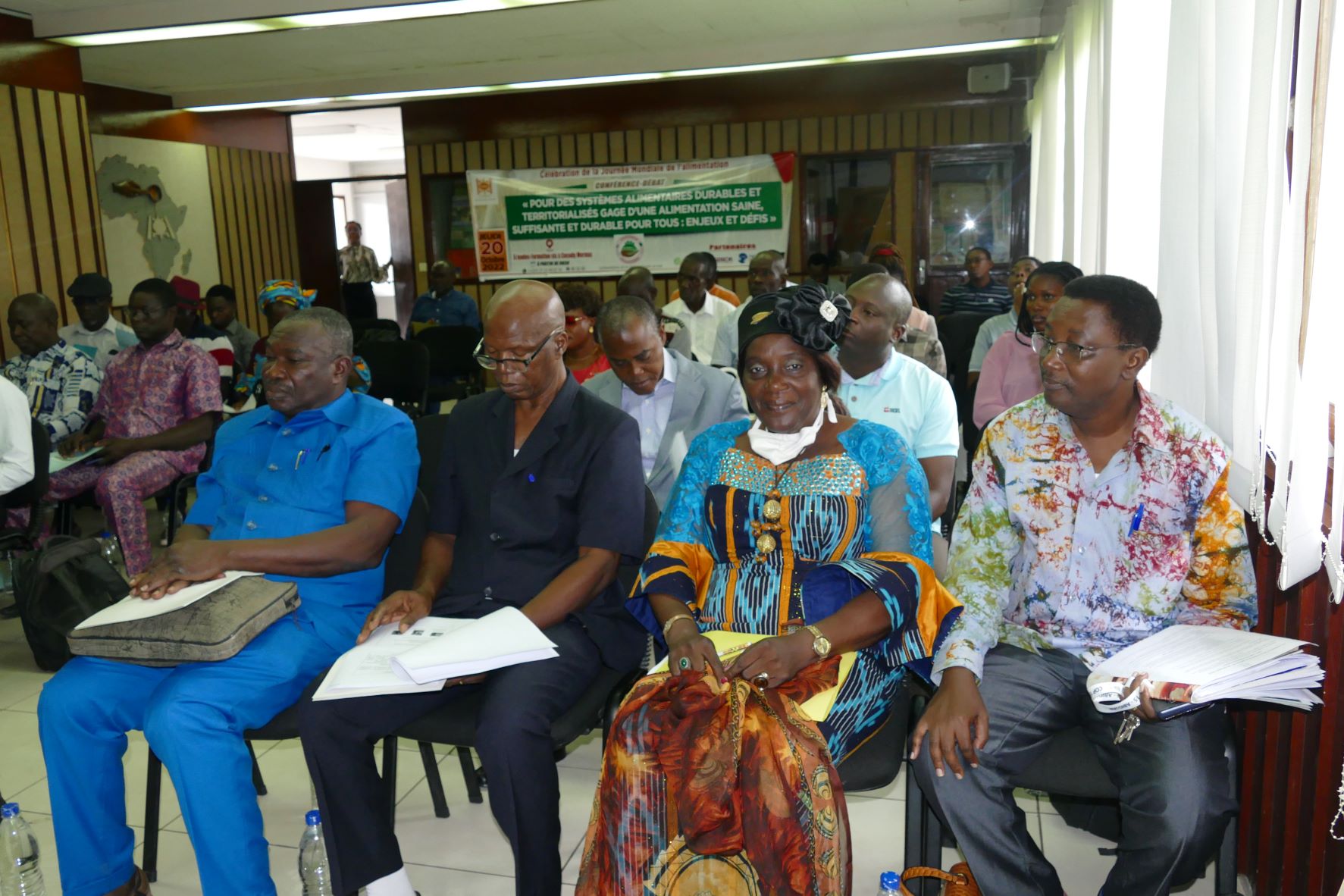La Journée Mondiale de l’Alimentation (JMA) est célébrée tous les 16 octobre. Cette année encore, Inades-Formation n’a pas voulu manquer l’occasion de sensibiliser l’opinion publique sur la nécessité d’une agriculture durable pour une alimentation saine pour tous.
Ainsi, pour contribuer aux réflexions de cette journée, le Secrétariat Général d’Inades-Formation a organisé une conférence débat, le 20 octobre 2022, dans ses locaux sis à Cocody, Abidjan sur le thème « Pour des systèmes alimentaires durables et territorialisés gage d’une alimentation saine, suffisante et durable pour tous : Enjeux et défis ».
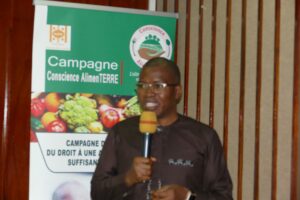
Pour M. Sena Adessou, Secrétaire Général d’Inades-Formation «il s’agit de « saisir cet espace pour sensibiliser et même interpeller l’Etat sur la nécessité de travailler à protéger le droit à l’alimentation saine des citoyens ».
Une quarantaine de personne ont pris part à la conférence à laquelle parmi lesquels, des producteurs, des associations d’étudiants, des membres de la société civile. Elle a fait intervenir quatre panelistes à savoir :
- Baridomo Pascal, chargé du plaidoyer au Secrétariat général d’Inades-Formation
- Professeur Traoré Karim Sory, professeur titulaire en Chimie de l’environnement à l’Université Nangui Abrogoua d’Abobo-Adjamé
- Mme N’Guessan N’Dri Aimé, Présidente de l’ONG HOUKAMI des femmes du Gbêkê, productrice et membre du Comité de pilotage de la PANAFCI et Présidente de la PANAFCI région du Gbêkê
- Professeur Ardjouma Dembélé, Directeur de recherche Agrochimie, écotoxicologue à l’Université Nangui Abrogoua d’Abobo-Adjamé
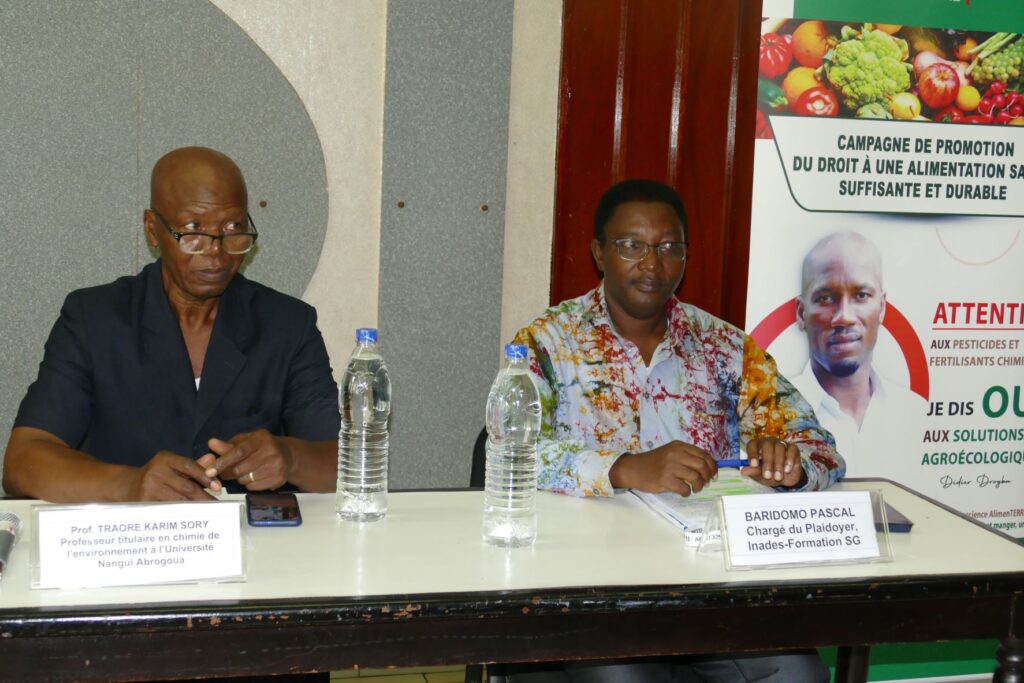
La substance du message principal diffusé demeure celui de la campagne Conscience AlimenTERRE, à savoir « Attention aux pesticides chimiques de synthèse ! leur toxicité est un danger pour l’environnement et pour la santé humaine, tant pour le producteur qui les utilise que pour le consommateur ».
En effet, les pesticides chimiques dont l’utilisation a explosé, principalement dans les pays d’intervention d’Inades-Formation, constitue un danger pour les sols, l’eau, l’air et pour la santé de l’homme.
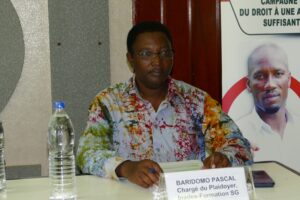 Dans son intervention intitulée : « Apprentissage sur les études exploratoires relatives à la réglementation et le fonctionnement du secteur des pesticides dans 7 pays”, M. Baridomo Pascal, a révélé combien les règlementations sur les pesticides étaient globalement faibles et mal mises en application dans les pays de l’étude.
Dans son intervention intitulée : « Apprentissage sur les études exploratoires relatives à la réglementation et le fonctionnement du secteur des pesticides dans 7 pays”, M. Baridomo Pascal, a révélé combien les règlementations sur les pesticides étaient globalement faibles et mal mises en application dans les pays de l’étude.
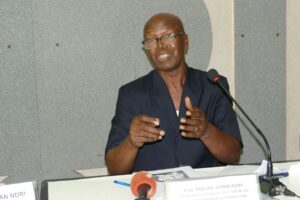 La présentation du Pr Traoré Karim Sory, sur “Pesticides chimique de synthèse et risques sur la sécurité sanitaire des aliments” a permis, quant à elle, de montrer comment les pesticides peuvent affecter la santé et le fonctionnement de l’organisme humain.
La présentation du Pr Traoré Karim Sory, sur “Pesticides chimique de synthèse et risques sur la sécurité sanitaire des aliments” a permis, quant à elle, de montrer comment les pesticides peuvent affecter la santé et le fonctionnement de l’organisme humain.
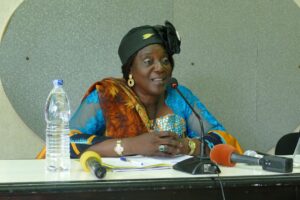 La parole a été donnée lors de ce panel aux producteurs à travers Mme N’Guessan Aimée, présidente de l’ONG Houkami et Présidente de la PANAFCI région du Gbêkê. Elle a par son témoignage dévoilé la réalité des champs et la cause principale de l’utilisation des pesticides et engrais chimiques de synthèse. Une utilisation mal contrôlée, de plus en plus excessive due au manque de main d’œuvre agricole dans les villages, à la pénibilité du travail et au manque d’encadrement des producteurs. Ces produits homologués ou non qui se trouvent à profusion sur le marché sont pulvérisés par des enfants et des femmes.
La parole a été donnée lors de ce panel aux producteurs à travers Mme N’Guessan Aimée, présidente de l’ONG Houkami et Présidente de la PANAFCI région du Gbêkê. Elle a par son témoignage dévoilé la réalité des champs et la cause principale de l’utilisation des pesticides et engrais chimiques de synthèse. Une utilisation mal contrôlée, de plus en plus excessive due au manque de main d’œuvre agricole dans les villages, à la pénibilité du travail et au manque d’encadrement des producteurs. Ces produits homologués ou non qui se trouvent à profusion sur le marché sont pulvérisés par des enfants et des femmes.
Parlant des produits prohibés, elle a lancé ce cri de cœur : « Que les décideurs agissent davantage en sévissant sévissent… face à ces produits qui sont vendus au vu et au su de tous… Que les responsables des ministères de l’agriculture viennent vers les paysans pour des campagnes d’informations et de sensibilisation sur les produits. »
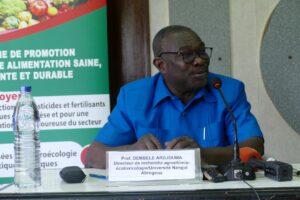 Le quatrième intervenant, le Prof Dembélé Ardjouma, n’as pas été à contrecourant de ces prédécesseurs. Appuyant leurs dires, il s’est prononcé sur les ” points de vigilance dans le choix et utilisation des pesticides compte tenu de leurs effets » en s’appuyant sur les 1ers apprentissages d’une étude de cas en cours, commanditée par Inades-Formation. L’étude s’est concentrée sur l’agriculture urbaine, à Abidjan et alentours constituée essentiellement par le maraichage. Dans le milieu, il n’est pas rare que les maraichers utilisent des produits destinés à d’autres cultures et ne respectent ni les méthodes de traitement ni les délais de carence. Malheureusement ces aliments sont mis sur le marché intérieur sans contrôle.
Le quatrième intervenant, le Prof Dembélé Ardjouma, n’as pas été à contrecourant de ces prédécesseurs. Appuyant leurs dires, il s’est prononcé sur les ” points de vigilance dans le choix et utilisation des pesticides compte tenu de leurs effets » en s’appuyant sur les 1ers apprentissages d’une étude de cas en cours, commanditée par Inades-Formation. L’étude s’est concentrée sur l’agriculture urbaine, à Abidjan et alentours constituée essentiellement par le maraichage. Dans le milieu, il n’est pas rare que les maraichers utilisent des produits destinés à d’autres cultures et ne respectent ni les méthodes de traitement ni les délais de carence. Malheureusement ces aliments sont mis sur le marché intérieur sans contrôle.
« La sécurité sanitaire des aliments doit répondre à une préoccupation régalienne. » a-t-il indiqué.
Les participants alarmés par la question ont fait plusieurs propositions en faveur du renforcement de la sensibilisation des différents acteurs, producteurs, autorités gouvernementales, parlementaires et sénatoriales pour que des mesures idoines soient prises pour réduire l’utilisation des pesticides chimiques dans l’agriculture.
Lire le rapport de la Conférence
A la fin de la conférence, Mlle Yao Esther du réseau africain des jeunes chercheurs, a dit toute sa satisfaction d’avoir assisté à ce débat : « J’apprécie vraiment ce genre de conférence parce que c’est une occasion qui nous est donnée de pouvoir réfléchir sur les problèmes qui nous concernent. J’ai eu beaucoup d’informations que je n’avais pas sur la situation des producteurs confrontés à ces problèmes. Il y a eu des ébauches de solutions comme l’éducation des producteurs et de la population afin qu’ils abandonnent les pesticides. J’exhorte les autorités à valoriser les résultats des recherches en matière de bio intrants. ».
Aller plus loin: voir le reportage de la conférence
Inades-Formation consacre la campagne Conscience AlimenTERRE à attirer l’attention sur la toxicité des pesticides chimiques de synthèse et demande aux producteurs d’opter pour des intrants bio, aux autorités de faire respecter les normes de sécurité et d’utilisation des pesticides tout en traquant les pesticides prohibés et aux consommateurs d’être plus regardant sur leur choix alimentaire afin d’encourager la production durable et saine des aliments.
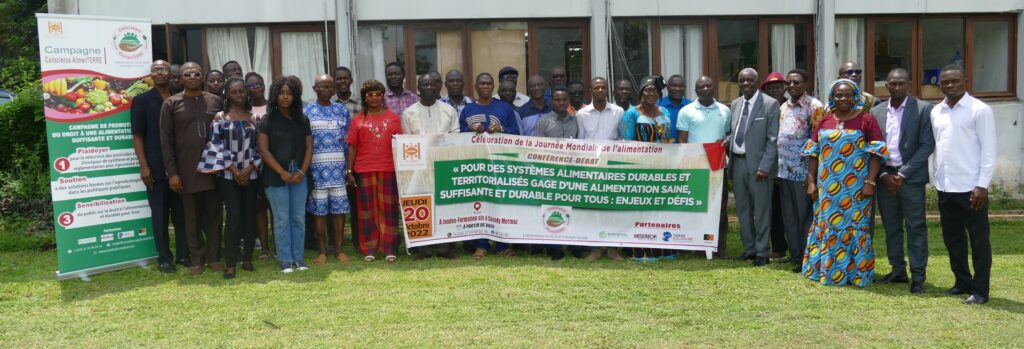
Lire le rapport de la Conférence
Aller plus loin: voir le reportage de la conférence
Moroh Achi Marcelle, Communication Inades-Formation – Secrétariat Général

